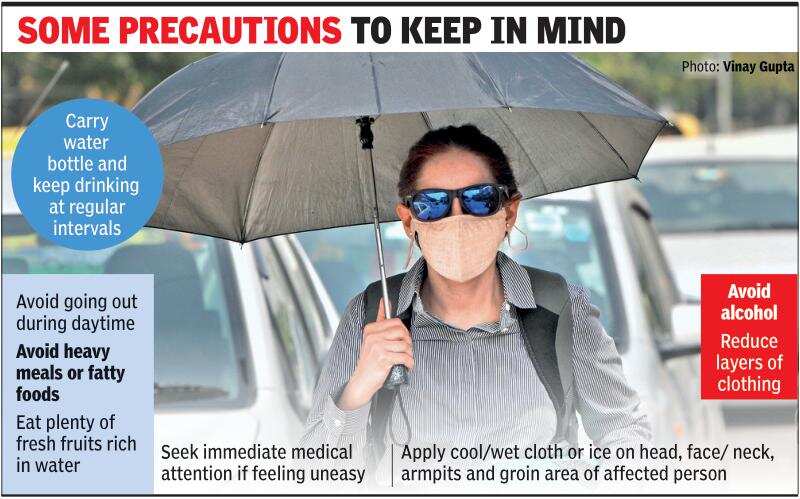- News
- City News
- gurgaon News
- Gurugram: Summer takes a toll, heatstroke cases rise
Gurugram: Summer takes a toll, heatstroke cases rise

Children play in a pond, formed after a water pipe leakage, during a hot summer day, at Signature Tower Chowk in Gurugram. (PTI file photo)
GURUGRAM: Even as the monsoon shows signs of approaching after a light spell of rain over the past couple of days, heatwave conditions continue to take a toll on residents.
Doctors in several hospitals across Gurugram said they are witnessing a rise in the number of patients with complaints of symptoms similar to those of heatstroke.

According to doctors, patients are suffering from high body temperature, higher than usual heart rate, cramps, headaches, loss of consciousness, diarrhoea, and dehydration. According to the health department, there is an upsurge of 40-50% of summer-related complications in the OPDs.
The doctors have advised senior citizens and children to avoid going out in the heat. Because of humidity and hot climatic conditions in the past few days, they suggest precautions from bacterial infections as well.
“In OPDs, cases of diarrhoea, heatstroke and dehydration because of extreme heat conditions are increasing every day. We are getting over 30 cases related to extreme heat waves daily. Exposure to heat conditions increases the vulnerability of persons with cardiovascular, respiratory and cerebrovascular diseases. People should hydrate themselves,” said Dr Virender Yadav, chief medical officer, Gurgaon.
Experts said heatstroke has become a regular phenomenon in this sultry summer. “Heat exhaustion starts instantaneously, followed by vomiting, feeling of thirst, rapid breathing, altered mental state/ behaviour, flushed skin, increased heart rate, high body temperature, muscle cramps and pounding headaches. It is suggested that people should be moved to a cool environment or shaded location and drink loads of fluids,” said Dr. Rajesh Kumar, internal medicine, Paras hospital. “People are advised to reduce clothing layers and a cool/ wet cloth or ice should be applied to the head, face, neck, armpits and groin area of the affected person. The person should also seek immediate medical attention. The delay can cause damage to the brain and other vital organs.”
The doctors explained that heatstroke is closely associated with prolonged exposure to heat. Under normal conditions, the body loses water through sweat, tears, breathing, urine and stool. This water is replaced by external fluids and food that contain water.
“The body may run out of water if an individual is overexposed to the sun and the water level is not restored. A dehydrated body can lose essential salts, such as sodium and potassium, further leading to a heat stroke,” said Dr Manjeeta Nath Das, internal medicine, Columbia Asia Hospital.
Doctors in several hospitals across Gurugram said they are witnessing a rise in the number of patients with complaints of symptoms similar to those of heatstroke.

According to doctors, patients are suffering from high body temperature, higher than usual heart rate, cramps, headaches, loss of consciousness, diarrhoea, and dehydration. According to the health department, there is an upsurge of 40-50% of summer-related complications in the OPDs.
The doctors have advised senior citizens and children to avoid going out in the heat. Because of humidity and hot climatic conditions in the past few days, they suggest precautions from bacterial infections as well.
“In OPDs, cases of diarrhoea, heatstroke and dehydration because of extreme heat conditions are increasing every day. We are getting over 30 cases related to extreme heat waves daily. Exposure to heat conditions increases the vulnerability of persons with cardiovascular, respiratory and cerebrovascular diseases. People should hydrate themselves,” said Dr Virender Yadav, chief medical officer, Gurgaon.
Experts said heatstroke has become a regular phenomenon in this sultry summer. “Heat exhaustion starts instantaneously, followed by vomiting, feeling of thirst, rapid breathing, altered mental state/ behaviour, flushed skin, increased heart rate, high body temperature, muscle cramps and pounding headaches. It is suggested that people should be moved to a cool environment or shaded location and drink loads of fluids,” said Dr. Rajesh Kumar, internal medicine, Paras hospital. “People are advised to reduce clothing layers and a cool/ wet cloth or ice should be applied to the head, face, neck, armpits and groin area of the affected person. The person should also seek immediate medical attention. The delay can cause damage to the brain and other vital organs.”
The doctors explained that heatstroke is closely associated with prolonged exposure to heat. Under normal conditions, the body loses water through sweat, tears, breathing, urine and stool. This water is replaced by external fluids and food that contain water.
“The body may run out of water if an individual is overexposed to the sun and the water level is not restored. A dehydrated body can lose essential salts, such as sodium and potassium, further leading to a heat stroke,” said Dr Manjeeta Nath Das, internal medicine, Columbia Asia Hospital.
FacebookTwitterLinkedinEMail
Start a Conversation
end of article
Quick Links
Delhi Air PollutionDelhi TemperatureChennai WeatherBangalore TemperatureCovid vaccination centres in DelhiCoronavirus in DelhiRTPCR test in GurgaonHyderabad RainPollution level in BangaloreDelhi SmogDelhi TemperatureNoida AQIGurgaon AQI todayFire in MumbaiMumbai RainsCovid 19 RT PCR Test in NoidaDelhi AQI todaySrinagar encounter
